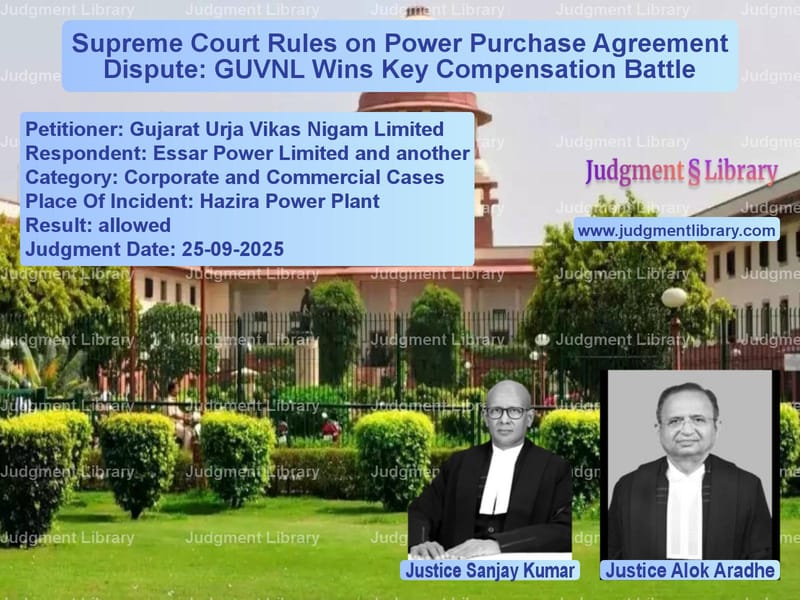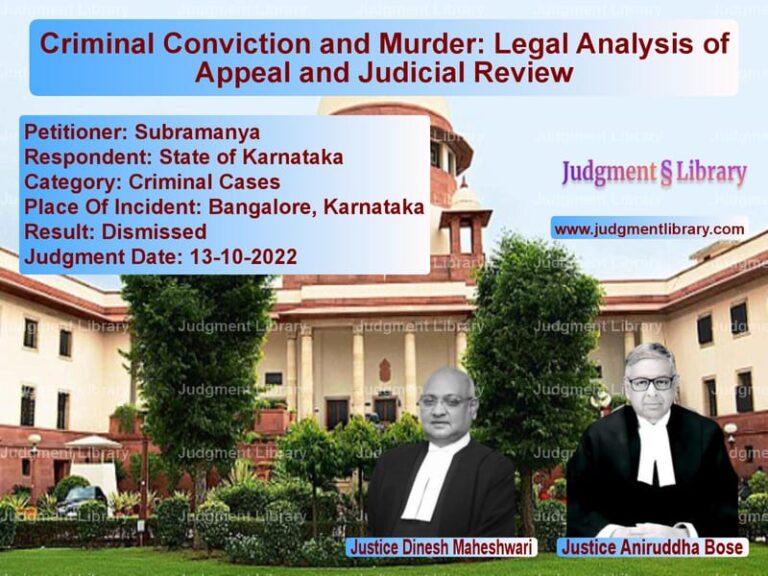Supreme Court Rules on Power Purchase Agreement Dispute: GUVNL Wins Key Compensation Battle
In a landmark judgment that brings closure to a two-decade-long legal battle, the Supreme Court of India has delivered a comprehensive ruling in the complex dispute between Gujarat Urja Vikas Nigam Limited (GUVNL) and Essar Power Limited (EPL). The case, which originated in 2005, involved intricate questions of contract interpretation, compensation calculations, and the obligations of power generating companies under Power Purchase Agreements (PPAs).
The dispute centered around a PPA signed on May 30, 1996, between Gujarat Electricity Board (GEB) – GUVNL’s predecessor – and EPL for the purchase of electricity generated from EPL’s 515 MW plant at Hazira. Under this agreement, 300 MW was allocated to GUVNL while the remaining 215 MW was allocated to Essar Steel Limited (ESL), EPL’s sister company. The core issue emerged when EPL began supplying more power to ESL from GUVNL’s allocated share, leading to what GUVNL termed as “wrongful diversion” of electricity.
The Genesis of the Dispute
The legal journey began when GEB detected that EPL was not adhering to the proportionate allocation principle of 58:42 (300 MW:215 MW) and was instead diverting electricity meant for GUVNL to its sister company ESL. This led to extensive correspondence between the parties, with GEB proposing recovery of Rs. 64 Crores for the period from April 1998 to September 2004. While EPL initially appeared to accept this settlement in its letter dated November 30, 2004, GEB clarified that this was not a final settlement, setting the stage for prolonged litigation.
The Supreme Court noted the factual background: “In breach of the agreed proportionate shares in the electricity generated by it, EPL started supplying more power to its sister company, ESL, from out of the allocated share of GEB.”
The Long Litigative Journey
The case went through multiple rounds of litigation before the Gujarat Electricity Regulatory Commission (GERC), the Appellate Tribunal for Electricity (APTEL), and finally the Supreme Court. In the first round in 2016, the Supreme Court had set aside APTEL’s judgment and restored GERC’s order dated February 18, 2009, which had established several key principles.
The Court emphasized the importance of reading its previous decision holistically: “We are of the opinion that such disjointed reading of specific paragraphs or even sentences, out of context, would not be the proper approach to understand the import of the decision. It must, necessarily, be read as a whole and in its entirety to glean the findings and ratio decidendi laid down therein.”
The Core Legal Issues
The Supreme Court identified several critical issues that needed resolution. The first concerned whether EPL was obligated to declare the capacity of its entire generating plant and allocate power according to the proportionate principle. The Court reaffirmed its earlier finding that “the PPA clearly contemplated the proportion of allocation of capacity between the two beneficiaries and EPL, necessarily, had to operate its generating plant to meet the requirement of electrical output that could be generated corresponding to the allocated capacity.”
Another significant issue was the computation methodology – whether the diversion of electricity should be calculated on an hourly or half-hourly basis. The Court noted that while the original PPA provided for hourly computation, EPL itself had approached the Central Electricity Authority (CEA) seeking advice on metering, and the CEA had recommended half-hourly recording. The Court observed: “Having invited that methodology for supply of power so as to avoid installation of a circuit breaker, EPL cannot fight shy of the same methodology being adopted for computation of the excess power diverted by it to ESL from out of the allocated share of GUVNL.”
The Fixed Charges Controversy
One of the most contentious issues was GUVNL’s claim for reimbursement of fixed charges for the electricity that was diverted to ESL. Both GERC and APTEL had rejected this claim, but the Supreme Court took a different view. The Court explained the distinction between compensation and reimbursement: “Reimbursement of fixed charges flowed from the provisions of the PPA itself and was not traceable only to the breach by EPL… The misconceived notion that ‘fixed charges’ were also to be included in the ‘compensation’ to be claimed by GUVNL, resulted in arguments being advanced before GERC and the APTEL to that effect and the rejection thereof.”
The Court made a crucial observation about the economic injustice of the situation: “In any event, it is not open to EPL to claim fixed charges twice over, by appropriating the excess fixed charges paid by GUVNL for electricity that was never supplied to it from its allocated proportionate share, on the one hand, and also pocketing the fixed charges paid by ESL for the extra electricity that was supplied to it from out of GUVNL’s share.”
The Court’s Reasoning and Final Ruling
The Supreme Court provided detailed reasoning for its decision, emphasizing that it was merely implementing the findings from its previous judgment. The Court stated: “We are merely giving effect to the clear findings of this Court in that earlier decision, irrespective and independent of how the parties understood them and how they formulated their cases on the basis of such understanding. This Court cannot be a mute spectator when its judgments and findings are misconstrued or misunderstood by the parties and are projected erroneously in a subsequent round of litigation.”
On the fixed charges issue, the Court was categorical: “The finding of GERC and the APTEL that GUVNL is not entitled to reimbursement of fixed charges is, therefore, unsustainable. Once GUVNL did not receive the electricity for which such fixed charges had been computed and paid on a monthly basis, it was entitled to reimbursement thereof, not as compensation, but on the principle of restitution as such payment was not at all due from it.”
The Court also addressed the computation methodology, ruling in favor of half-hourly basis: “As the power diversion, for which GUVNL has to be paid compensation, is for the supply made by EPL to ESL, over and above its allocated share, and as it was at the behest of EPL itself that this half-hourly computation methodology was adopted, pursuant to the recommendation of the CEA, there is no reason why the very same methodology should not be used for computing the electricity diversion.”
Conclusion and Impact
The Supreme Court’s judgment brings clarity to several important aspects of power purchase agreements and the obligations of generating companies. By distinguishing between compensation for wrongful diversion and reimbursement of fixed charges, the Court has established an important precedent that prevents double recovery by power generators.
The Court modified the orders of both GERC and APTEL, directing that GUVNL is entitled to both compensation computed on the basis of HTP-1 Tariff Energy Charge and reimbursement of fixed charges for the diverted electricity. The Court also upheld the half-hourly computation methodology for determining the quantum of diverted electricity.
This judgment not only resolves a long-standing dispute between the parties but also provides valuable guidance for similar cases in the power sector. It reinforces the importance of adhering to contractual obligations in PPAs and establishes clear principles for calculating compensation when such obligations are breached. The ruling demonstrates the Supreme Court’s commitment to ensuring that contractual interpretations don’t lead to unjust enrichment and that parties are appropriately compensated for breaches of agreement.
Petitioner Name: Gujarat Urja Vikas Nigam Limited.Respondent Name: Essar Power Limited and another.Judgment By: Justice Sanjay Kumar, Justice Alok Aradhe.Place Of Incident: Hazira Power Plant.Judgment Date: 25-09-2025.Result: allowed.
Don’t miss out on the full details! Download the complete judgment in PDF format below and gain valuable insights instantly!
Download Judgment: gujarat-urja-vikas-n-vs-essar-power-limited-supreme-court-of-india-judgment-dated-25-09-2025.pdf
Directly Download Judgment: Directly download this Judgment
See all petitions in Contract Disputes
See all petitions in Corporate Compliance
See all petitions in unfair trade practices
See all petitions in Damages and Compensation
See all petitions in Commercial Arbitration
See all petitions in Judgment by Sanjay Kumar
See all petitions in Judgment by Alok Aradhe
See all petitions in allowed
See all petitions in supreme court of India judgments September 2025
See all petitions in 2025 judgments
See all posts in Corporate and Commercial Cases Category
See all allowed petitions in Corporate and Commercial Cases Category
See all Dismissed petitions in Corporate and Commercial Cases Category
See all partially allowed petitions in Corporate and Commercial Cases Category







